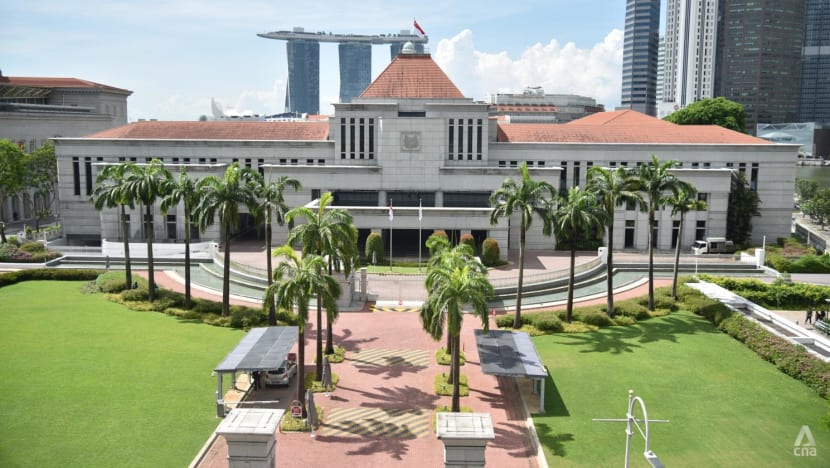Parliament to discuss Mobile Guardian breach, extremist preacher and mpox
MPs have also filed questions on the revamped Gifted Education Programme.

A view of Parliament House in Singapore. (File photo: CNA/Syamil Sapari)

This audio is generated by an AI tool.
SINGAPORE: Members of Parliament will discuss the Mobile Guardian cybersecurity breach at the next sitting on Monday (Sep 9), as well as issues relating to the extremist preacher from Bangladesh who delivered a sermon in Singapore.
There were also questions filed on the current mpox situation and the revamped Gifted Education Programme (GEP).
According to the order paper released on Friday, MPs asked if students affected by the Mobile Guardian app incident were receiving the necessary help.
Mobile Guardian is a device management app installed on personal learning devices used by students. It enables parents to manage students’ device usage by restricting applications or websites and screen time.
The Ministry of Education (MOE) said in August that Mobile Guardian would be removed from all students’ personal learning devices after a global cybersecurity breach affected about 13,000 students from 26 secondary schools in Singapore.
The students had their devices wiped remotely by the perpetrator, and many were worried about losing access to their notes with the exams looming.
MP Patrick Tay (PAP-Pioneer) asked MOE for details on what it is doing to help students who have had their study notes wiped out.
MP Lim Wee Kiak (PAP-Sembawang) asked if “targeted support” is being offered to affected students experiencing distress, particularly those with existing mental health conditions.
Some also asked for an update on the incident, including if steps are being taken to avoid similar incidents and if there would be a review of the use of technology by students.
MP Gerald Giam (WP-Aljunied) wanted to know how many students were unable to recover their data and if the ministry has a backup of the data.
Questions were also filed in relation to the Bangladeshi preacher who delivered an illegal and extremist sermon to migrant workers at a dormitory in Tuas.
Amir Hamza managed to enter Singapore because he used a passport with a name different from what was in the country’s security databases, the Ministry of Home Affairs (MHA) said last month.
MHA said its Internal Security Department was aware of Amir Hamza’s background, but “did not have his biometrics at the time of his entry”.
MP Yip Hon Weng (PAP-Yio Chu Kang) asked how the Immigration and Checkpoints Authority (ICA) mitigates the risk of individuals using fraudulent documents to enter Singapore, and if there are other safeguards beyond the use of biometrics to identify dangerous individuals.
MP Zhulkarnain Abdul Rahim (PAP-Chua Chu Kang) wanted to know about the rules governing the use of foreign worker dormitories for events involving speakers or religious preachers, while NMP Neil Parekh Nimil Rajnikant wanted to know about the penalties in place to deal with dormitory owners when such incidents occur.
MPOX, GEP
Questions filed on mpox included requests for an update on the virus and the local situation, as well as border and social management measures.
MP Wan Rizal (PAP-Jalan Besar) asked about screening and monitoring protocols for travellers from regions with known mpox outbreaks. He also wanted to know about measures to enhance public awareness of the symptoms and transmission nodes.
MP Melvin Yong (PAP-Radin Mas) asked if mpox posed a severe health risk to vulnerable individuals such as seniors and children, and if there is a need for a nationwide rollout of mpox vaccines for this group.
MP Hany Soh (PAP-Marsiling-Yew Yee) wanted to know about the applicable precautions and lessons that have been learned from Singapore’s effort against the COVID-19 pandemic.
Earlier this week, Singapore said that it will offer the mpox vaccine to healthcare workers who are at the highest risk of exposure to the disease as well as close contacts of confirmed cases.
The announcement came against the backdrop of growing concern about the clade 1 strain, which prompted the World Health Organization to declare mpox a global public health emergency for the second time in two years.
To date, Singapore has not detected any clade 1 infection. All 14 mpox cases in the country so far this year have been of the less severe clade 2 subtype.
On the revamped Gifted Education Programme, MPs asked for more details on how it will be implemented.
The gifted programme, a curriculum catering to intellectually gifted students, will be overhauled and replaced with a new approach for high-ability learners in all primary schools.
This was announced by Prime Minister Lawrence Wong during his maiden National Day Rally.
MPs wanted to know how MOE would build on lessons learned and how it would address any potential disparity in resource allocation and learning opportunities between students in the GEP and those in the mainstream programme.
FOOD HYGIENE, SKILLSFUTURE, BILLS
Other questions filed by MPs include a query on whether the authorities will review the adequacy of penalties for food hygiene violations in light of recent mass food poisoning cases.
MPs also asked for more details about the SkillsFuture Jobseeker Support scheme and if the authorities would consider increasing penalties to prevent the misuse of personal mobility aids (PMAs) by able-bodied persons.
Six Bills are set to be introduced, including the Elections (Integrity of Online Advertising) (Amendment) Bill.
The Platform Workers Bill and Casino Control (Amendment) Bill are also among the four scheduled for second reading.








.png?itok=HDVnxDwH)





